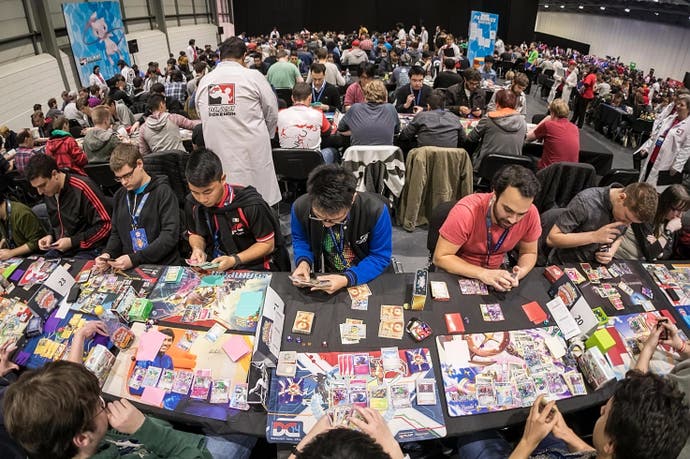PokéManiacs: the grownups who love Pokémon
Wild Pokémania used Return!
Midway through last year, I moved house. That's not hugely interesting in itself I know - everyone moves house at some point - but this was a big one, out of my old, rural family home and into a place of my own. Little country boy Chris in the big city, fresh off the tractor, all dewey-eyed and open-mouthed at the bright lights and bustling noise of the metropolis.
OK that description may have been dramatised in places but forgive me, it's been a weird few months. House moves, being what they are, often bring with them an uncomfortably up-close look at one's life trajectory and that, very easily, turns into a spot of self-reflection. Oli, for example, turned those reflections on his gaming clutter into some very nice thoughts on the benefits of life after console generations. My reflections aren't really that smart. But I do have them! For me, the thing looking back at me during that big ugly look in the mirror was a little boy who really loves Pokémon.
This is all setting me up rather nicely for a very long, very detailed retelling of my life story through some kind of Poké...lens. That's not going to happen but you'll be glad to know I do have a nice anecdote for you - and there's even a moral to the story, too!
For some time, I've been drawn towards the alluring, baffling complexity of competitive Pokémon. I'm not particularly interested in playing it or actually competing, mind - I just find it weirdly interesting to read about Pokémon builds, and strategies, and how it all works.
A little while ago, in that haze of fascination, I found Smogon University, a community-run group dedicated to Pokémon's competitive scene, and after frolicking in the glorious detail of tier lists, build breakdowns, and general analyses for a little while I soon discovered they do a weekly giveaway of perfectly-bred, pre-trained Pokémon for competitive use. Suddenly it's not just one but the two parts of my brain that are aroused - the only two I've found to be prone to compulsive tendencies I've discovered thus far - collection and strategizing, all rolled together in one.
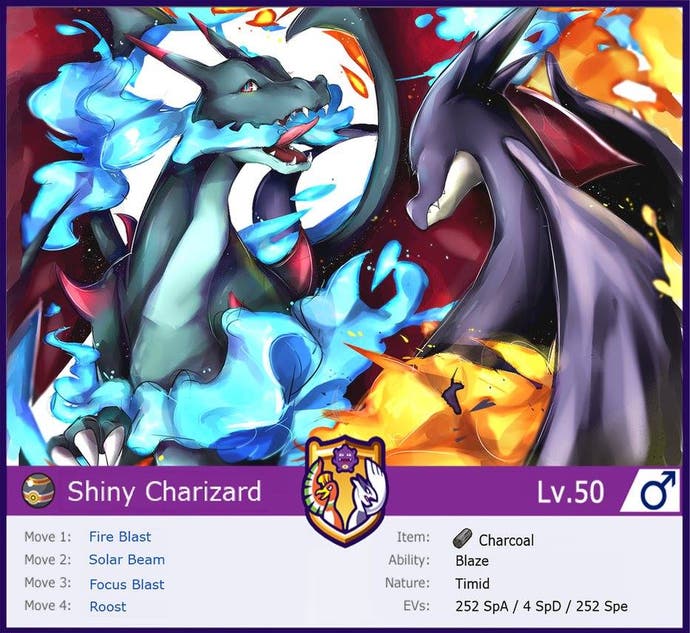
I had to have every Pokémon they gave away. I mean I didn't have to - this was, luckily, one of those 'soft' addiction things, the "just five more minutes" kind that's so prevalent in video games - but I definitely wanted to get these strategically perfect Pokémon badly enough to dedicate half a Saturday, every Saturday, to the giveaway for some time.
As you might expect that isn't really practical - especially with the aforementioned house move and a partner who, very understandably, doesn't fancy playing second fiddle to my 3DS on the limited days off we have together. So I had to rethink, and soon enough found a happy solution: these giveaways are done through social media, and the thing about social media is that you're not the only one there. I quickly found someone willing to trade the giveaway Pokémon they didn't have a use for and voilà, my collection was back up to date. The moral of the story: Pokémon helped me make a friend.
OK just kidding, that's a terrible moral. In fact if I wanted to talk about making friends through Pokémon I have a much nicer, probably more interesting anecdote about playing the Trading Card Game at a weekly meetup in Gatwick Airport, of all places, so I would have talked about that instead.
The actual moral is that, flashback to the house move, and my feelings were very different to what I anticipated. There I am, expecting to start weeping over a slightly mouldy Mewtwo plushie, my childhood tossed remorselessly into a bin bag destined for some unlucky charity shop, and instead I can't help but think about how there are an awful lot of other people out there who must have been through a similar thing. Maybe a few differences - perhaps it was a scruffy Jigglypuff instead of a mouldy Mewtwo that they dug out of the attic - but ultimately a lot of it (including the 'Dark Years' of Pokémon Diamond and Pearl, where it looked like the franchise might slowly die, and the slight indignance at all the pop-up fans during last summer's resurgence of Pokémania) was probably the same.
Towards the end of last year, as Pokémon Sun and Moon were gearing up for launch, I had a few opportunities to attend a few Pokémon events. I knew I wanted to talk to fans, maybe get a sense of what they liked about the franchise so much, and in light of all the above the obvious angle was to figure out why, exactly, this game is so broadly popular.
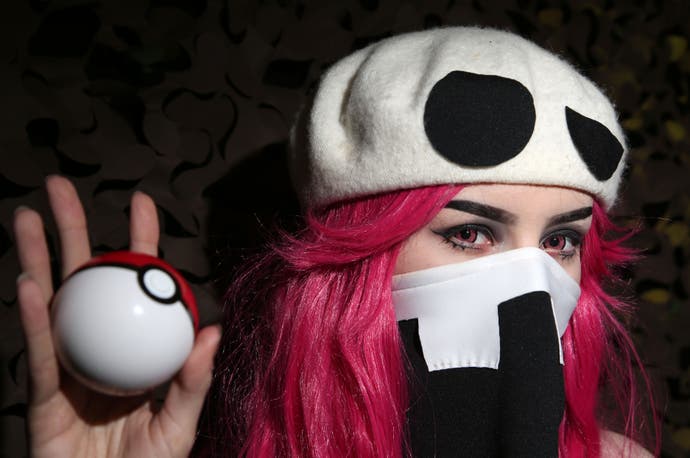
The first of those events was the Pokémon Sun and Moon launch party - less exclusive schmooze-fest, despite the Shoreditch address, more a 'celebration', it was a lively evening setup for about a thousand Pokémon fans from the general public. A mini convention - a fete, almost - squeezed in on a school night with giant Rowlet mascots and little cups of orange juice available from the Hawaiian beach hut stands.
Kimmy and Danni, 25 and 26 respectively, dressed as their favourite Pokémon (Kimmy a Zubat, Danni generally adorned in stuff related to Gible) were the first punters I cornered for an opinion. The pair met through a community for trading Pokémon memorabilia and are now best friends. I asked Danni what it was about Pokémon that held her interest for so long:
"It sounds bad but, it's almost like a force of habit at this point. They come out and you're like well, I've been playing them this long… I may as well keep going!" She jokes. "But honestly a big part as well is just the friends I've made through it...the new game comes out and everyone's like 'Oh are you buying the new game? What Pokémon do you like from it?' All that kind of stuff. So it becomes almost like this big social event when a new one comes out."
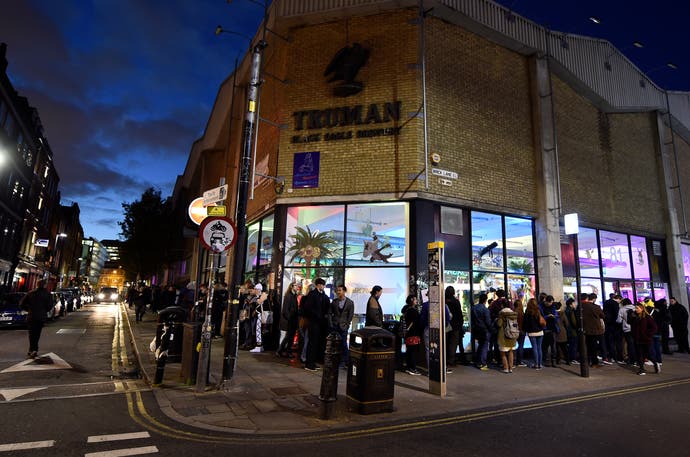
Kimmy agrees. "But also it's very, very nostalgic, and I really feel that it does make me feel very young to still be into it… being excited with all the 12 year olds these days when a new game comes out like 'yeah!'"
The duo, who actually sound like characters that would stop you for a showdown in-game - "Twins Danni and Kimmy challenged you to a battle!" (they were OK with this joke, I promise) - also explained the trading community that brought them together in a little more detail. "Basically a community where people come and trade merchandise for their favourite Pokémon, and everyone collects their favorites." Danni explains, "and that's how we met, because Kimmy lived nearby to me and she didn't want to pay shipping."
"I said I'll come pick up stuff that you're selling, and then it just blossomed into a beautiful, beautiful friendship," says Kimmy.
Meeting through Pokémon was definitely a theme, as the next group I spoke with made clear. A gang of Team Skull cosplayers - Peter, Amy, Jake, Taylor, James, Justice, Jason, and another Amy, ages scattered between 18 and 22, homes dotted around England (plus Justice's California) - met through their rather specific passion for cosplaying as Pokémon's nefarious 'Teams' - Rocket, Skull, Magma and so on - known for their comically ludicrous motivations for nicking everyone's Pokémon and taking over the world. And for impeccable anime pun-names like Jesse and James.
The group actually assembled gradually. "We'd all just happen to do the same series together and meet each other, and then we'd say "Oh you're cool" and pick someone up and do more together." Although there was one time that clearly moulded the group more than any other.
"MAGMAAA!" - that's all of them shouting by the way - "Pokémon's been like a big thing that everybody likes, it's a big mutual interest... it's something that's all brought us together so doing Teams, doing Magma brought us together as a really close squad."
I would have pressed them on that meeting but they way they all shouted "Magma" was a bit intimidating, so I moved on. I feel obliged to mention just how excellent their Team Skull cosplay was though, including, even, the evil bosses Guzma and Plumeria before the games had released and their characters fully detailed.
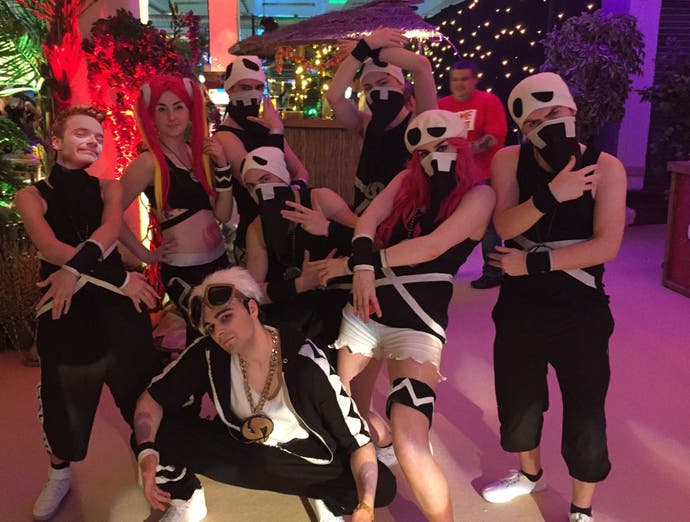
In a similar vein, at least in terms of commitment to the brand, I also found a brother and sister, Charlotte and Josh, one of whom with a Pokémon-themed tattoo. Obviously the existence of video game tattoos isn't quite so astonishing these days but this was a particularly cool one - and it's also a nice segue from the Team Skull kids. Charlotte has, on her lower leg, an image of the three original starter Pokémon, Bulbasaur, Charmander, and Squirtle, playing the Pokémon game themselves on a Game Boy Colour.
Like so many fans, 2016's resurgence of the franchise made its mark on them. The siblings both started playing with that first generation, inspired by the franchise's unavoidable influence when the initial craze was at it's zenith: "we always used to watch Pokémon before school growing up, and then obviously at school you'd have the cards in the playground, so yeah we played from the very first games when it came out" Charlotte tells me, but she only had her tattoo done "probably three or four months ago." I probably should have asked for a picture.
Pokémon's bounceback over the course of last year has been well documented, but there's a core fanbase there that never left. Stuart, from Dublin, started with Pokémon Blue. "I got it for Christmas when I was 7, and so, that's when I started playing Pokémon. I own all of them now, every one that's come out."
Something I knew before I got talking to other fans face to face was that Pokémon has a uniquely broad appeal. Danni and Kimmy are clearly into collecting (in fact Danni's acquired everything there is on her favourite Pokémon, Gible, and so had to move onto other collectibles), whilst Team Skull have cosplay covered. Stuart, however, was the only person I spoke to at the launch party who was really embedded in one of Pokémon's most driving communities: competitive play.
"There's definitely some nostalgia to it. I still enjoy going back [to the early games] and I get a Charmander, and I raise it up to a Charizard, and it's always amazing. But yeah, I'd say the competitive side is what I spend most of my time on now." A programmer by trade, into "a lot of the statistics behind it and stuff," but who still grew up at just the right time to be gripped by nostalgia, Stuart is perhaps the quintessential non-pro competitive fan. "One of my friends insists that competitive battling doesn't exist, that Pokémon are trained by love, and it's like 'OK…' - but then he did actually beat me in one battle which we won't let me forget!"
"I've made some applications for keeping track of competitive battling and stuff like that… It's a kind of hobbyist thing, there's a level of play where you just have to play it all the time, and I play too many other games to get good enough at it to get to the top of those kind of things, and that's what I'd want to do. But I have good fun online, and people still beat me at it - I always try to use competitive strategies but with Pokémon that I like, so it's kind of a best of both."
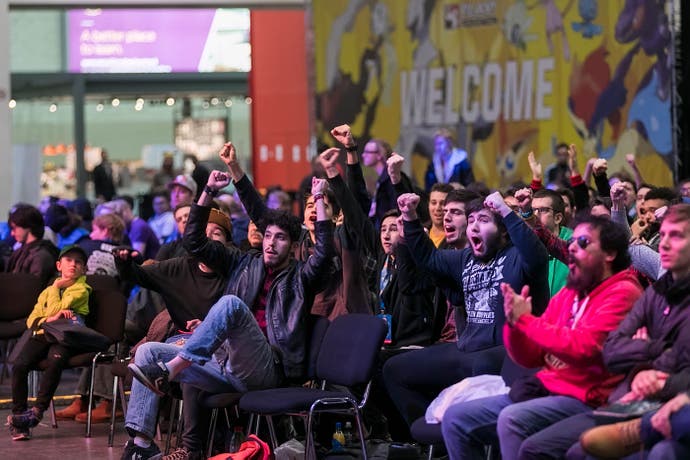
A month or so later, and I'm heading back to the East End, this time the ExCel convention centre for the Pokémon European International Championships. Another thousand-or-so fans in attendance to both compete in and watch the Trading Card Game (TCG) and Video Game Championships (VGCs), I only made it up for the final of the tournament's three days, with the VGCs the focus.
Sparing you the play-by-play stuff - there's a great write-up of the event over on Pokémon's official site if you really fancy it - the Championships were interesting to me primarily because it was a chance to speak with the players. I mentioned I have a weakness for the particularly obtuse, strategic side to games, with competitive Pokémon exercising it's alluring draw of hidden stats and min-maxed builds over me for some time.
Finally getting a chance to sit down with some of the game's best competitive players, it turns out Stuart from Dublin had it pretty right. You really do need to dedicate everything to competitive Pokémon if you want to get anywhere.
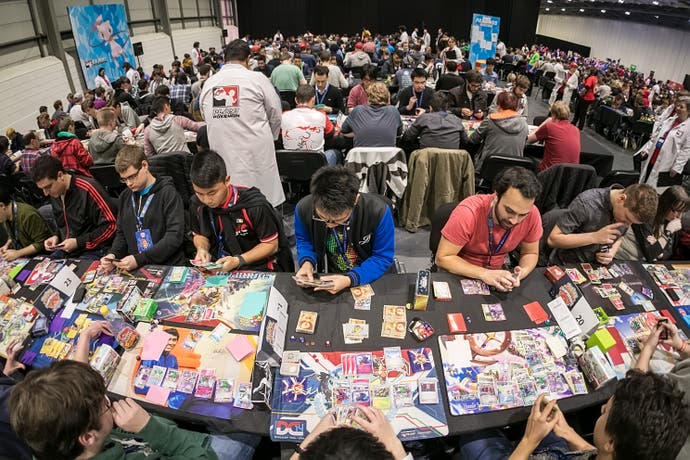
Ben Kyriakou is 24, something of a veteran by Pokémon standards, and the highest-rated British player in the VGC Masters division, finishing in the top four at the European Championships. Like all of the top players he also has a 'real' job, with what he calls "random overtime" added in. Alongside that, Ben manages to fit in practice for the Championships: "at my peak, like five or six hours a day" of training, whilst he averages at around two to three hours in the quiet periods. In the lead up to a tournament, he says, "literally every minute of every day I'm thinking about it."
Even better, this particular Championship's timing, just two and a half weeks after Sun and Moon's launch, meant that only Pokémon from Sun and Moon's Alola region were allowed. In theory that should help - there are only 302 Pokémon in the Alola Pokédex, as opposed to the now 802 in total - meaning fewer Pokémon, movesets, and permutations to be familiar with. In practice, it's the opposite. "Day one," Ben tells me, "I was playing with one team. By day five, it wasn't good any more."
That's because with the new games come 180-odd new Pokémon, with new moves, abilities, held items, Alolan forms, and even game-changing mechanics like Z moves to learn, analyse, and factor into their strategies. Then - and I know I said I'd stay out of the nitty gritty stuff, but bear with me - there's the EV (effort value) and IV (individual value) training that needs to be done in order for the selected Pokémon to stand a chance.
In brief, that's the tens or even hundreds of hours of breeding that needs to be done to acquire the right hidden 'genes', or IVs, and then the hours of actually boosting specific stats that's EV training. Think of it like breeding the perfect racehorse, and then putting in the time to train and feed it properly to be at the absolute peak of performance. Neither is enough to win without the other. In fact Ben says "nobody at the tournament, if you got into day two, would have had anything less than perfect" ratings for their Pokémon's EVs and IVs. You can see why I got so into those giveaways.
It's an enormous undertaking. Ben drafted in a friend to help him with that particularly grind-heavy side of the preparation in order to be ready in time, "including soft-resetting" the game dozens of times to get legendaries, like the ubiquitous Celesteela, with the right Nature - yet another factor that needs to be exactly right in order to stand a chance at a tournament. All of this was done "within the last three to four days" before the Championships, with the other two weeks spent playing through the game and figuring out it's new Pokémon and systems, before he settled on a strategy.
Competitive Pokémon is, quite obviously, an incredibly time-consuming practice. But success at major tournaments like the European Championships, which grant the top four players Championship Points (which count towards a trip to the 2017 Worlds in the USA) also takes a remarkable amount of skill.
Not the usual type of skill that's associated with competitive gaming and esports, of course - save the twitch reflexes for Pokken Tournament - VGC Pokémon, I'd argue, is esports' answer to Chess.
Alongside Ben Kyriakou, I also spoke with the equally amiable Miguel Martí de la Torre, now the Masters Division European Champion. He described the last-minute preparation for this tournament as "really, really crazy," but was also aware of just how crucial the European Championships would be. "I thought, "OK, if I want to go to Worlds this year too, this first International is going to be the most important to continue playing this year", because you have a lot of [Championship] Points there, and people who win get to travel to other internationals." Similarly to Ben, he had to put in a serious shift to be ready in time. "I was like OK, let's play twenty-four seven for these two weeks, and then when I return home tomorrow, I'm not going to play for a few days."
As with so many multiplayer-intensive games now however, Pokémon also has a meta. Fan communities, like Smogon, put together comprehensive tier lists for Pokémon viability, whilst a small number of particular moves or combinations are often banned, in both official and fan-organised competitions, in order to maintain balance.
"There are people who like to play anti-metagame teams, but in my case I always like to play the normal 'meta' Pokémon, but give them my style, my details," Miguel says. I quiz him what exactly that style is. "I think I'm not a very 'raw' player, in terms of using raw Pokémon [with a lot of powerful stats], but I always try to have a surprise with each Pokémon." He gives an example of Tapu Koko, one of the new Pokémon which was prominently used with the held item, Life Orb. "In my case I used Focus Sash for a surprise, and leave him in for an Earthquake."
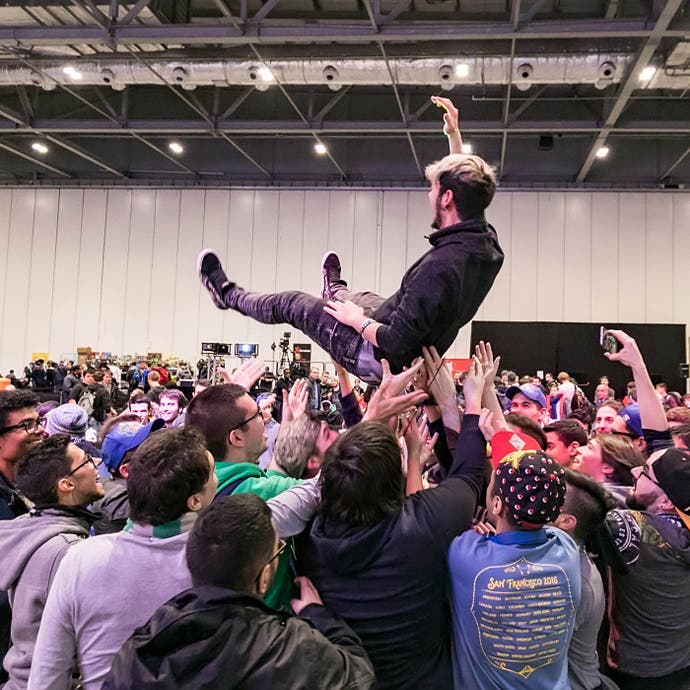
In case this is all gibberish, basically that's a big gamble, sacrificing the safe option of added power for the ability to survive a single attack that would normally knock Tapu Koko out. Bear in mind, with all this intricate decision-making, that these are just two of the more than 500 different items a Pokémon could hold in battle, each with a unique effect. It's these seemingly tiny, yet hugely significant trade-offs that can be the difference at this level of play.
There's an astonishing level of commitment to the game from the likes of Ben and Miguel. At this point, though, I'm beginning to make them out like the robo-nerds of esports we all picture on hearing that horrible portmanteau. Of course they aren't. They're open, candid professionals, who sacrifice time with friends and girlfriends for the passion they grew up with and continue to hold dear. Ben first started playing competitively at eleven, when we was knocked out early on in a Championship in Birmingham, but took a break for some time, playing the game for fun, until he came back to competitive play a few years down the line. Miguel started competitive play much older. It's evident, talking to them, that they both loved Pokémon first, before they loved the competition.
There were so many more people there I wished I could have talked to: the fans - fans-of-fans, you could say, given these tournaments are open to anyone - who turn up in their droves from across Europe to watch their favourite players compete, and yell "F*CK YOU, GASTRODON!" when the stalling Pokémon goes down at last in a seemingly-endless round; the volunteers who help run the events, known as Professors, that must pass what I hear is a pretty rigorous test of knowledge before they're allowed to chip in, officiating Trading Card Game matches between seven-year-olds on their weekend; the parents who drove their kids halfway across the country only to get knocked out in Round One (actually that might have happened to me once… sorry mum).
Nonetheless, with the day winding down, I chat a little longer with Ben and Miguel about how it played out. Ben airs his frustrations over the way he was eliminated in the semi-finals. He feels it was his game to lose: "I got it into my head that I could play a perfect endgame, where I couldn't lose, if I switched out a Pokémon … and it was the wrong play." He feels psyched himself out (you can watch the exact moment in the clip above, or the full battle here). Still, finishing in the top four, Ben only has a few more Championship Points to pick up before he qualifies for the World Championships, which he expects to make. Miguel, meanwhile, has plans to spend his prize money from the tournament "to travel" - to other Pokémon tournaments, of course. He wants to stay in the European top 16 after all, and that means more competitions to attend all over the continent.
What struck me at this point, after my interviews had finished, was that I forgot something - I hadn't, after all that, actually asked anyone at either of these events why they loved Pokémon. That was supposed to be the whole point of me going. To tie this all back into my house move and my lovely friend anecdote, the conversations with all these fans made it pretty clear that everyone has an anecdote or two of their own, explaining why they love this thing so much, and after all it's pretty obvious: people like nostalgia, they like feeling young, they like reimagining the favourite moments of their past, they like collecting stuff and cute animals and shiny things, and that's great. This game has so intricately wound its way into so many people's lives though that I realised, talking to them all, that the "how" was so much more interesting than the "why".
